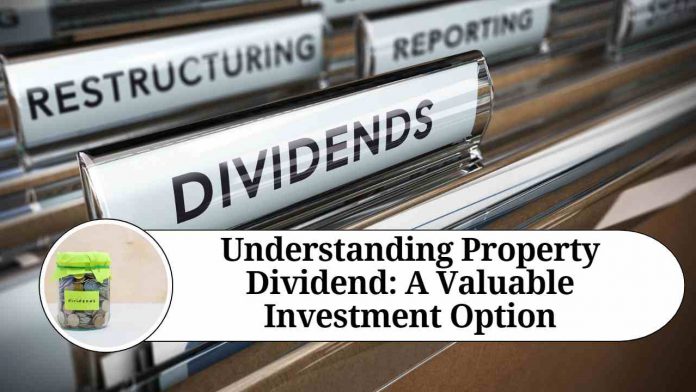Introduction
Investors are constantly on the lookout for ways to maximize their returns and diversify their portfolios. One such investment option that often piques their interest is property dividend. While dividends are commonly associated with cash payouts, property dividends provide investors with an opportunity to receive tangible assets as a form of return. In this blog, we will delve into the concept of property dividends, its benefits, and its implications for investors.
What is a Property Dividend? A property dividend refers to the distribution of assets or property by a company to its shareholders as a form of dividend payment. Instead of receiving cash, shareholders are given physical assets such as real estate properties, equipment, inventory, or other valuable holdings owned by the company. This alternative dividend distribution method offers investors the chance to obtain tangible assets that can potentially appreciate in value over time.
Benefits of Property Dividends:
- Diversification: Property dividends provide investors with an opportunity to diversify their portfolios by adding physical assets to their holdings. This diversification can help reduce risk and protect against market volatility, as the value of physical assets may not be directly correlated with traditional financial markets.
- Potential for Appreciation: Unlike cash dividends, which provide immediate liquidity, property dividends offer the potential for long-term capital appreciation. If the distributed assets appreciate in value over time, shareholders can benefit from both regular dividends and the potential increase in the value of the received property.
- Inflation Hedge: Real estate and other tangible assets have historically been considered a reliable hedge against inflation. By receiving property dividends, investors can safeguard their wealth against the eroding effects of inflation, as the value of physical assets may rise along with the general price levels.
- Tax Advantages: Depending on the jurisdiction, property dividends may offer certain tax advantages for shareholders. In some cases, the distribution of assets may be taxed at a lower rate compared to cash dividends. Additionally, the appreciation of the received property may be subject to favorable tax treatment, such as long-term capital gains rates.
Considerations for Investors: While property dividends can be an attractive investment option, there are a few important factors to consider before opting for this form of dividend payment:
- Liquidity: Property dividends may lack the liquidity of cash dividends, as it can be challenging to convert physical assets into cash quickly. Investors should carefully assess their liquidity needs and consider whether receiving tangible assets aligns with their investment goals and timeframe.
- Due Diligence: Before accepting property dividends, shareholders must conduct thorough due diligence to evaluate the quality, marketability, and potential value appreciation of the distributed assets. Assessing the condition, location, and future prospects of the property can help ensure the investment aligns with the investor’s objectives.
- Management and Maintenance: Owning physical assets, such as real estate, comes with responsibilities. Investors must consider the costs and efforts associated with managing and maintaining the received property. This includes expenses such as property taxes, insurance, repairs, and finding suitable tenants (if applicable).
Conclusion
Property dividends offer investors a unique opportunity to diversify their portfolios and potentially benefit from the appreciation of tangible assets.
While they may lack the immediate liquidity of cash dividends, property dividends provide a way to acquire valuable assets that can serve as an inflation hedge and potentially appreciate in value over time. As with any investment decision, thorough due diligence and careful consideration of individual circumstances are crucial before opting for property dividends. Related Blogs: Statutory Audit Procedure
By understanding the concept of property dividends and its implications, investors can make informed choices to enhance their investment portfolios.
Frequently Asked Questions (FAQs)
Q1: What is a property dividend?
A property dividend refers to the distribution of assets or physical property by a company to its shareholders as a form of dividend payment. Instead of receiving cash, shareholders receive tangible assets such as real estate properties, equipment, inventory, or other valuable holdings owned by the company.
Q2: Why do companies choose to issue property dividends?
Companies may choose to issue property dividends for various reasons. It can be a way for them to efficiently distribute their assets and provide shareholders with a tangible return on their investment. It may also help the company diversify its operations or streamline its focus by transferring non-core assets to shareholders.
Q3: How are property dividends different from cash dividends?
The main difference between property dividends and cash dividends lies in the form of the distribution. Cash dividends provide shareholders with a monetary payout, while property dividends involve the transfer of tangible assets or property. Cash dividends offer immediate liquidity, whereas property dividends offer the potential for long-term appreciation and diversification.
Q4: What types of assets can be distributed as property dividends?
Companies can distribute a wide range of assets as property dividends, depending on their holdings and operations. Common examples include real estate properties, land, buildings, equipment, inventory, and even intellectual property rights. The specific assets distributed as property dividends depend on the company’s nature of business and available holdings.
Q5: Can property dividends appreciate in value?
Yes, property dividends have the potential to appreciate in value. The value of distributed assets, such as real estate, can increase over time, resulting in capital appreciation for shareholders who receive them. However, it’s important to note that the value of assets can also fluctuate and may not always appreciate.
Q6: How are property dividends taxed?
Taxation of property dividends can vary depending on the jurisdiction and specific circumstances. In some cases, the distribution of assets may be subject to capital gains tax or other applicable taxes. The appreciation of the received property may also be subject to tax upon its eventual sale. It’s advisable to consult with a tax professional or financial advisor to understand the tax implications of property dividends in your specific situation.
Q7: Are property dividends suitable for all investors?
Property dividends may not be suitable for all investors. They require careful consideration of factors such as liquidity needs, investment goals, and the ability to manage and maintain the received property. Investors should assess their individual circumstances and objectives before deciding to accept property dividends.
Q8: Can property dividends be converted into cash?
While property dividends involve receiving physical assets, it is possible to convert them into cash. However, the process of converting property into cash may take time and involve various considerations, such as finding buyers, assessing market value, and transaction costs. The liquidity of property dividends is generally lower compared to cash dividends.
Q9: How can investors evaluate the value of received property dividends?
Investors should conduct thorough due diligence to evaluate the value of received property dividends. This may involve assessing factors such as the condition, location, marketability, and potential appreciation of the property. Consulting experts, conducting property appraisals, and considering market trends can help in assessing the value of the received assets.
Q10: Are property dividends common?
Property dividends are relatively less common compared to cash dividends. Most companies opt for cash dividends as a more straightforward and liquid form of distributing profits. However, property dividends can be seen in certain industries or situations where companies have substantial tangible assets to distribute or when it aligns with their strategic objectives.




















